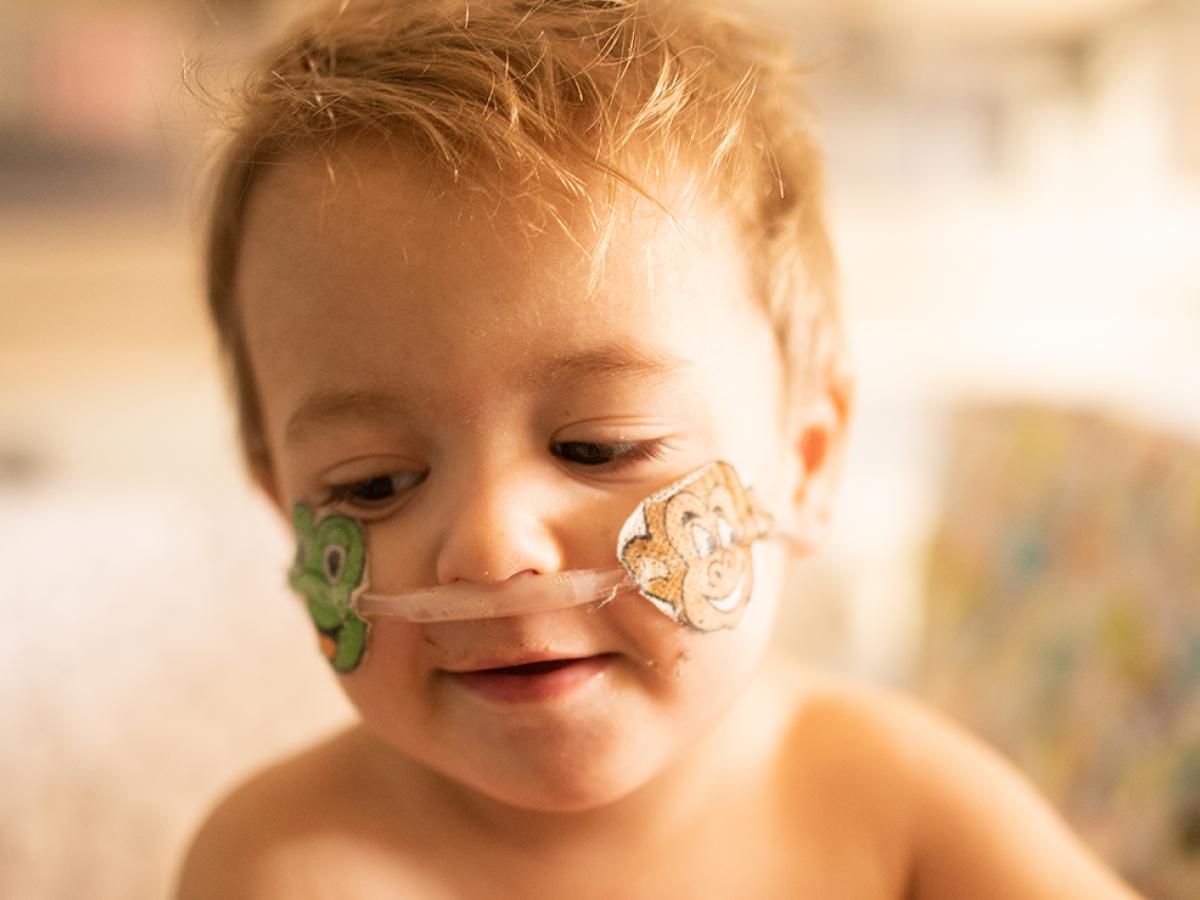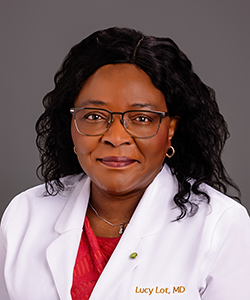October 29, 2024

“Flu season” is a term most people know. But influenza (flu) isn’t the only seasonal illness that’s concerning. If you’re pregnant or have young children, you may want to keep RSV (respiratory syncytial virus) on your radar. This respiratory infection is the reason nearly 80,000 children under 5 end up hospitalized each year in the United States. It’s the leading cause of infant hospitalization.
 “The severity of RSV infection can range from mild to moderate to severe,” says MU Health Care pediatrician Dr. Lucy Lot. “In some children, it appears as an upper respiratory infection — like a cold. But if it becomes severe, RSV can be dangerous.”
“The severity of RSV infection can range from mild to moderate to severe,” says MU Health Care pediatrician Dr. Lucy Lot. “In some children, it appears as an upper respiratory infection — like a cold. But if it becomes severe, RSV can be dangerous.”
To help you keep your infant and young children healthy this winter, Dr. Lot shares what every parent needs to know about RSV:
1. Nearly All Children Will Get RSV Before Age 2
For most young children, RSV infection is like a common cold with symptoms that may include:
- Congestion
- Coughing
- Decreased appetite
- Fever
- Runny nose
- Sneezing
Parents of young children with mild cases of RSV may not even know their children have had the infection. But odds are, your child will have RSV by the time they are 2 years old.
“If it’s just cold symptoms and your child acts normal, eats well and has good color, you can manage the symptoms at home,” Dr. Lot says. “We treat it like any other respiratory virus — we maintain hydration, manage the fever and suction mucus to make breathing easier.”
But some children with RSV infection can develop concerning symptoms.
2. Recognizing Severe RSV Symptoms in Infants and Children Is Critical
In some children, RSV progresses from a mild upper respiratory infection to the lower respiratory tract. That’s why it’s vital to monitor your child’s symptoms, Dr. Lot says, no matter how mild they initially appear. RSV symptoms can sometimes become severe and affect your child’s breathing if they develop pneumonia, bronchiolitis (inflammation in the lungs’ airways) and apnea (short pauses in breathing).
Keep an eye on your infant’s:
- Breathing: Listen for wheezing and changes in breathing patterns. If your child’s breathing is faster than usual or you notice retractions — the chest and abdomen pull in with each breath — you should have them evaluated by a physician.
- Color: If your child’s lips, mouth or fingernails appear to have a blue or gray tint, they need to be evaluated immediately.
- Eating and drinking: If your infant hasn’t had a wet diaper in eight to 12 hours, they may be dehydrated and should see a medical professional.
If your child looks relatively well, is feeding and breathing easily and having an adequate number of wet diapers, Dr. Lot suggests calling your child’s pediatrician first. They can discuss the symptoms and may instruct you to continue managing at home, schedule an appointment or go to an urgent care or the emergency department if symptoms are more severe. If a child older than 2 has a cold or virus that is lingering or worsening, have them evaluated.
3. The Risk of Severe RSV Is Higher for Some Children
The risk for RSV in children generally depends on their age and baseline health. Children born prematurely or who are under 8 weeks old, for instance, are extremely vulnerable because their lungs and immune systems are not fully developed.
Any child under 2 has an increased risk for severe RSV illness, but Dr. Lot says the risk may be especially high for children with:
- Asthma, chronic lung disease or cystic fibrosis
- Prematurity, especially those born before 35 weeks gestation
- Congenital heart defect
- Down syndrome
- Weakened immune system
- Exposure to secondhand smoke
Knowing you have a high-risk child is a good reason to seek medical treatment sooner. “We don’t typically manage RSV with breathing treatments,” Dr. Lot says. “But if an infant with RSV has a history of wheezing or an asthma diagnosis, they need to be seen because they may benefit from a breathing treatment.”
4. RSV Is Highly Contagious
Like other cold viruses, RSV is spread by direct contact and respiratory droplets — think handshakes, coughs, sneezes or anything that involves touch or saliva. The droplets contaminate whatever they land on. A cough or sneeze can send droplets several feet away.
But Dr. Lot says RSV is especially contagious for two reasons:
1. The virus can survive on surfaces and objects for hours.
2. People with RSV can spread the virus anywhere from 11 days to several weeks.
“Someone with RSV can unknowingly leave their germs on a chair, phone, toy or door handle,” Dr. Lot says. “If your child touches that surface hours later, they could contract the infection.”
To protect your child, teach them to:
- Cough into their elbow, sleeve or a tissue
- Use their elbow to push doors open if possible
- Wash hands with mild soap and water (preferably) or use alcohol-based sanitizer often, including before leaving school, before eating, after playing and after visiting public places
- Avoid touching their faces
- Minimize contact with sick individuals
If you have cold symptoms, wash your hands often and keep your distance from young children if possible — in case you have RSV.
5. The RSV Vaccine and Antibodies Offer Protection
Until recently, proper hand hygiene was your best defense against RSV. In 2023, the Food and Drug Administration (FDA) approved an RSV antibody injection and vaccine that protects children and vulnerable adults from developing severe RSV-associated illness. Both have shown a lot of promise. During its first year of implementation, the RSV antibody injection was shown to decrease RSV-associated severe illness by about 80%.
“If an immunized child comes in contact with RSV, they may still contract the infection,” Dr. Lot says. “But they’ll have antibodies in their system to help them fight it off.”
RSV immunization is currently offered:
During Pregnancy
When RSV vaccine is administered during pregnancy, the antibodies produced are passed to the baby in the womb. The baby is born protected and the antibodies last from five to six months — typically long enough to protect a newborn through their first RSV season.
The vaccine is offered from September through January to women who are 32 to 36 weeks pregnant. Getting the vaccine any later in the pregnancy doesn’t allow you enough time to build antibodies and pass them to the baby during the same RSV season. If you received the RSV vaccine, your newborn would not need to receive the RSV antibody injection.
“Current recommendation is once you get the RSV vaccine during one pregnancy, you don’t need a vaccine with subsequent pregnancies,” Dr. Lot says. “However, the babies born during those subsequent pregnancies will need to receive the RSV antibody injection to ensure adequate protection.”
For Infants and Young Children
If you don’t get the RSV vaccine during pregnancy, your newborn can receive the antibody injection. This is not a traditional vaccine like other childhood immunizations — the injection offers immediate protection because it delivers antibodies (your baby doesn’t have to build them).
If you did not receive the vaccine and your baby did not receive the antibody injection prior to hospital discharge, you can ask for the injection at your pediatrician's office.
Antibody injections are offered from October through the end of March to infants younger than 8 months old. Babies born during the season can receive the injection before being discharged from the hospital. The sooner it is administered, the sooner the baby is protected. Only one injection is currently recommended.
“Antibody injections are also offered and strongly recommended to older babies between 8 and 19 months who have an underlying medical condition that puts them at higher risk for severe RSV infection,” Dr. Lot says. Check with your child’s pediatrician to see if your child meets criteria for the injection during their second RSV season.
For Older Adults
Older adults are also at high risk for developing severe RSV infection — likely because of their weakened immune systems and likelihood of several potential underlying diseases at this age. Getting the RSV vaccine is critical to protect this population and the young children they interact with.
The RSV vaccine is recommended for people who are:
- 75 and older
- 60 to 74 with underlying diseases that increase their risk
- 50 to 60 after consultation with your physician
“Up to 500 children under age 5 die every year in the U.S. from RSV-related illnesses,” Dr. Lot says. “But if we all work together to raise awareness, take the proper precautions and protect our infants and the elderly, we can greatly reduce the impact of RSV.”
Next Steps and Useful Resources
- Want to discuss with a pediatrician? Find one today.

